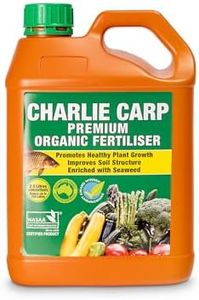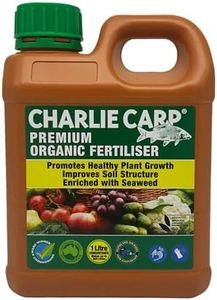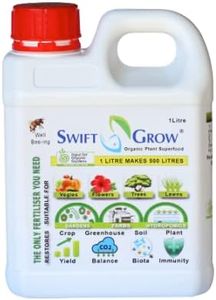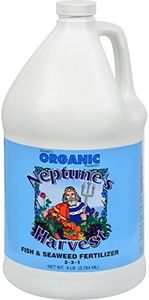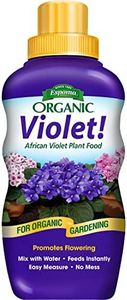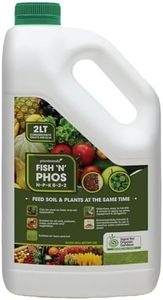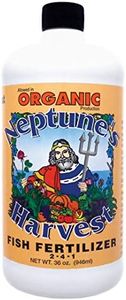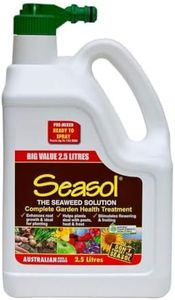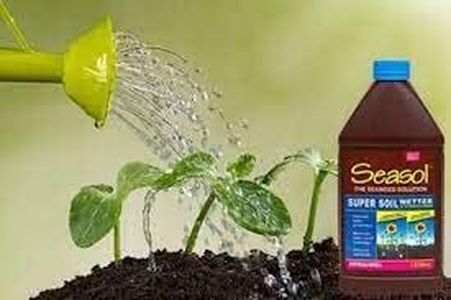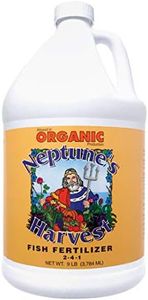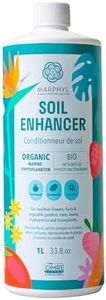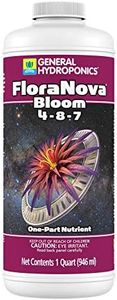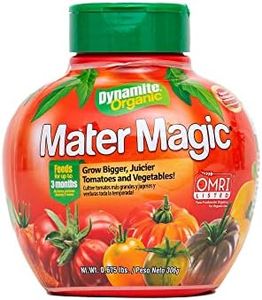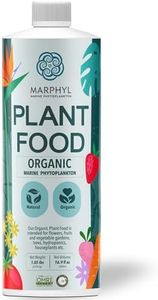We Use CookiesWe use cookies to enhance the security, performance,
functionality and for analytical and promotional activities. By continuing to browse this site you
are agreeing to our privacy policy
10 Best Organic Liquid Fertilizers
From leading brands and best sellers available on the web.By clicking on a link to a third party's website, log data is shared with that third party.
Buying Guide for the Best Organic Liquid Fertilizers
Choosing an organic liquid fertilizer can feel overwhelming due to the variety of options available, but focusing on a few important aspects will help you select the best product for your gardening or farming needs. To start, consider the types of plants you have, their stage of growth, and the specific requirements of your soil. An ideal liquid fertilizer should promote healthy plant growth without harming the environment, and should be easy for you to apply consistently. By understanding the key specifications of these fertilizers, you can make an informed decision and maximize the benefits for your plants.Nutrient Content (N-P-K Ratio)The N-P-K ratio stands for Nitrogen (N), Phosphorus (P), and Potassium (K) content, which are the main nutrients plants need. Nitrogen helps plants grow leaves, phosphorus supports roots and blooms, and potassium is important for overall health. The ratio may look like 3-2-2 or 5-1-4 on a label, indicating the amount of each nutrient present. Lower ratios (like 2-1-2) are gentler and suitable for delicate or young plants, while higher ratios (such as 8-4-6) are typically chosen for rapid growth or heavy-feeding plants. When selecting a product, match the N-P-K ratio to your plant’s growth stage—use higher nitrogen during leafy growth, more phosphorus for root development or flowering, and balanced mixes for all-purpose feeding.
Source of IngredientsOrganic liquid fertilizers are made from natural materials like seaweed, compost, fish emulsion, or plant extracts. The source affects how fast nutrients are available and the range of micronutrients and beneficial substances included. Animal-based sources (like fish or manure) provide rapid nutrient release, while plant-based or composted options are milder and more sustainable. If you prefer vegan or animal-free gardening, opt for plant-derived fertilizers; for maximum growth, fish-based types might suit you. Think about your values, environmental concerns, and plant sensitivity when choosing the source.
Additional Nutrients and AdditivesSome liquid fertilizers contain extra micronutrients such as calcium, magnesium, or iron, plus beneficial microbes or humic acids to further support plant health. These extras can help address specific deficiencies or improve overall soil vitality. If your plants show signs of nutrient problems (like yellowing leaves), or your soil is known to lack certain elements, pick a fertilizer with appropriate additives. Otherwise, for general use, a simple organic formula will suffice.
Concentration and DilutionLiquid fertilizers come in concentrated or ready-to-use formats. Concentrates need to be mixed with water before applying, offering flexibility to adjust strength and greater value per bottle, but requiring careful measurement. Ready-to-use types are easier—just apply directly without mixing—making them suitable for beginners or quick applications. Choose a concentrate if you have many plants and want cost-efficiency; opt for ready-to-use for convenience or if you’re caring for a few houseplants.
Application MethodSome fertilizers are meant to be applied to the soil around the plant roots (root drench), while others can be sprayed directly on the leaves (foliar feed). Foliar feeding gives fast results and is good for emergencies, but not all formulas are appropriate for this use. Check the label for application recommendations. If you want versatility, pick a fertilizer suitable for both soil and foliar use; if you're looking for ease, go with the method you find most comfortable to apply.
Certified Organic StatusCertification from trusted organizations confirms that a fertilizer is truly organic and free from synthetic chemicals or GMOs. If organic authenticity is important, look for products certified by recognized bodies. For those less concerned with certification and more focused on plant results, this may be less of a priority. Always check for certification if your plants are part of a certified organic growing system.
